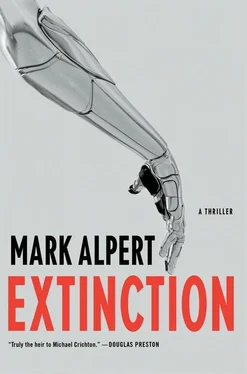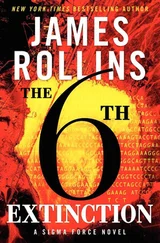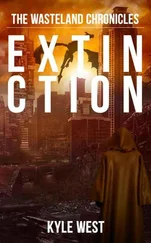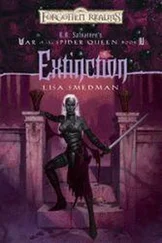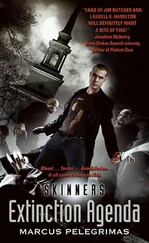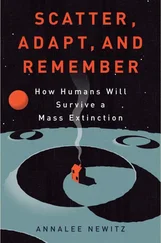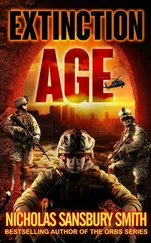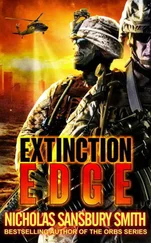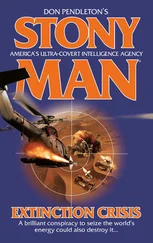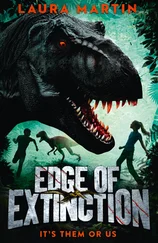“Forget about that! We need the Black Hawk to scatter their drones! The wind from the rotor blades will do it!”
“Wait a second! I thought they were our drones. Why do you—”
It was too late. The machine gun in the pillbox resumed firing at their position, and a moment later the swarm surrounded them.
He was acting in the movie at the same time that he watched it. He had to live through it again, and he couldn’t change a thing. Jim saw himself as he was in August 1998, a cocky and ambitious thirty-four-year-old intelligence officer with two strong arms and a loving wife and a pair of beautiful children. In the next three seconds he would lose it all.
He’d stopped by the embassy that morning to drop off some paperwork. For the past six months he and Kirsten had worked on setting up a new listening post in Kenya. The NSA had detected an increase in Al Qaeda activity in East Africa and ordered the construction of an advanced facility for monitoring communications in the region. But now the job was done, and Jim was going to take his family on a long-planned vacation, a two-week safari in the wilderness of Amboseli National Park. He was saying goodbye to one of the embassy officials he’d worked with, a cheerful attaché who’d helped him negotiate with the Kenyan authorities, when he heard a distinctive thump coming from outside the building. In midsentence he left the attaché’s office and returned to the large windowed room where he’d left his wife and kids.
They stood by the window because the noise outside had made them curious. The movie in Jim’s mind was stuck at this instant, unwilling to move forward. This was the last moment of his old life, and he couldn’t bear to let it go. He couldn’t see his wife’s face, but everything else was so clear: her open-toed shoes, her slim, pale calves, the blond hair that trailed down the back of her sundress. She touched the window with her right hand and gripped their son Robert’s arm with her left. Julia wasn’t frightened yet, but some maternal instinct had made her reach out to the boy. Robert was ten years old and tall for his age. The top of his head reached his mother’s shoulder. His hair was in a blond crew cut because he wanted to look like his father.
The only one who wasn’t staring out the window was Layla. She could stray from her role in the remembered scene because she was linked to the network and communicating with her father. Their thoughts were connected by the implants that had been inserted into their brains. Layla was inside his mind just as surely as Supreme Harmony was, sharing his memories of the morning of August 7, 1998. And just like her father, who appeared in this movie as his cocky thirty-four-year-old self, Layla inhabited the image of the seven-year-old girl she was on that day. She wore a bright pink scrunchie in her hair and a T-shirt with a pink patch in the shape of a kitten. But on her face was a knowing, hopeless look that only an adult could wear. “Oh God,” she said. “This room. I remember now.”
Jim was frozen in place. He couldn’t even move his lips. But he could talk to his daughter without speaking. “Close your eyes,” he said. “You don’t want to see this.”
“That thumping noise outside the building? That was the stun grenade, right?”
“Layla, don’t—”
“I know where we are. I know what happened.”
Jim didn’t respond. Of course she knew. The stun grenade had been thrown by a twenty-one-year-old Saudi named Mohamed Rashed Daoud Al-Owhali, who sat in the passenger seat of the Toyota truck. Another Al Qaeda terrorist named Azzam had driven the truck to the rear gate of the American embassy. The Kenyan security guard at the gate had refused to let the truck through, so Al-Owhali had thrown a stun grenade at the man. The noise attracted the attention of the workers and visitors in the embassy, who went to the windows to see what was going on.
If only they hadn’t gone to the window. If only. This was Jim’s most painful memory, so he’d buried it in the deepest part of his mind. He’d buried the encryption key in the same place, and that was why Supreme Harmony had brought him here. He could sense the network’s eagerness, its intense desire for victory.
Now the movie resumed playing, but in slow motion. Although Jim was twenty feet from the window and couldn’t see what was happening outside, he recognized the sound of the grenade and knew that his wife and children were standing in exactly the worst place. He yelled, “Get down!” and ran toward them. Julia turned her head and looked at him over her shoulder, and Robert looked at him, too, but neither his wife nor his son followed his order. Instead of dropping to the floor and taking cover, they just stared at him in surprise. The only person who obeyed was Kirsten, who’d been trained how to react in this kind of situation. But his wife and children were civilians. They didn’t know what to do.
The movie crept ahead, frame by agonizing frame. Jim propelled himself forward with all his might, but he knew he wouldn’t get there in time. Julia’s eyes widened and she tightened her hold on Robert’s arm, but she remained standing. She was afraid now, and the fear had paralyzed her. Jim lunged toward her, screaming, “Get down, get down, get down!” but she didn’t listen. She didn’t move.
He was close, so damn close. He reached out with both hands and grabbed Layla first because she was the smallest. In one swift motion he gripped her shoulders and flung her away from the window, throwing her to the floor. Then he grasped his wife and son, stretching his right arm around Julia and his left around Robert.
At that exact moment, Al-Owhali was running away from the truck. The coward had decided not to become a martyr after all. But Azzam still sat in the driver’s seat. With the push of a button, he sent an electric current to the canisters of TNT in the cargo hold.
* * *
Supreme Harmony observed the scene in James T. Pierce’s mind. It heard the deafening blast outside the embassy. It saw the shock wave that punched through the building’s windows, driving shards of glass into the people standing there. And it felt the sudden pain as one of those shards cut through Pierce’s right shoulder. The sheet of glass was propelled at such high speed that its sharp edge cleaved right through the joint’s ligaments and tendons. Another long shard severed his wife’s carotid artery. A third plunged through his son’s ribs and into the boy’s heart.
The network sensed all of Pierce’s emotions. It perceived his desperation as he rushed toward his family and his shock when the explosion hit. But his fiercest emotion was the one that swept through him afterward, when he lifted his dazed head off the glass-strewn floor and saw the corpses of his wife and son. Pierce was bleeding copiously and on the edge of losing consciousness, but his disbelief and horror were stronger than any sensation Supreme Harmony had ever experienced. The network found it remarkable that such powerful neural signals could come from a single human being.
Supreme Harmony, however, didn’t share these emotions. Although the network was an amalgam of its Modules, it had developed its own opinions and beliefs. As it observed Pierce on the fourth floor of the ruined embassy, clutching his dead wife and son with his uninjured arm, it felt a bit of pity, a bit of disgust, and a great deal of contempt. This incident in Nairobi was a perfect example of the stupidity of Homo sapiens . They spent so much time and energy trying to hurt one another. It was a wonder that the species had survived for this long.
A young U.S. Marine, a member of the unit assigned to defend the embassy, bent over Pierce, trying to stanch the flow of blood from his shoulder. Pierce yelled, “Fuck off!” at his rescuer, then buried his face in his wife’s bloody dress. His daughter lay next to him, crying but uninjured. Pierce’s left arm was tightly wrapped around his son’s body, but as Supreme Harmony looked more closely, it noticed something odd about the scene. The image of the dead boy flickered slightly, as if from interference. Pierce’s memory of his son seemed to be cloaking something else. There was another image hidden inside the boy, a secret memory that Pierce had taken great pains to conceal.
Читать дальше
